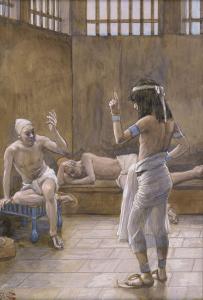
“And they said unto him, We have dreamed a dream, and there is no interpreter of it. And Joseph said unto them, Do not interpretations belong to God? tell me them, I pray you.” (Genesis 40:8)
To be completely honest, I prefer Chapter 41 of Genesis over Chapter 40. Chapter 41 is a reassuring portrait of justice being meted out in the life of Joseph; it is a perfect picture of God rewarding His own faithful servant and lifting him from the depths of an Egyptian prison cell to the second most powerful position in all of the land. It is that blissfully comforting resolution which is common in all of our favorite stories (fiction and factual) and the ending that we all so wistfully yearn for at the turning points in our own lives. But Joseph is not a remarkable man because he knows how to trust God while seated on a throne beside Pharaoh, but because he knows how to trust God while chained to the wall of a prison cell.
Joseph is just as aware that he has been placed exactly where God wants him in the bowels of Pharaoh’s dungeon as he will later be in the majesty of Pharaoh’s court. Like the Apostle Paul will declare centuries later, Joseph is able at the end of his own life to declare without pretension that he, too, knows how both to be abased and to abound (Phil. 4:12). It is the rarest of faith that is not content to simmer in the recesses of the soul during seasons of trial, compelling the suffering servant to remain silent around others about his beliefs until his trust in God is visibly vindicated. Joseph’s is not a faith barely hanging on as it so often feels when we face our own darkest hours, but a vivacious and exuberant trust in the Living God.
That he remains ever cheerful even in the confines of incarceration is evidenced by Joseph’s heartfelt concern for his temporary companions as he is moved by their dampened demeanor on the morning following their revelatory dreams. “Wherefore look ye so sadly today?”, he inquires (v. 7). Such a question posed to men in a desperately hopeless situation who know nothing of the Providence of God must, in itself, seem peculiar at best. Nevertheless, the chief butler and the chief baker share their concerns with the chief trustee of Pharaoh’s prison. “We have dreamed a dream“, they lament, “and there is no interpreter of it.” Joseph’s response, in light of all that he has gone through hitherto, is extraordinary: “Do not interpretations belong to God?…”
It was not very difficult to stand as a faithful witness of God’s goodness and glory adorned in the coat of many colors and living in the warmth and safety of his father’s house, but what about in the prison cell? Joseph continues to glorify God and tell others about Him even as his own circumstances appear to be deteriorating beyond hope. What must the butler and baker have thought about this young Hebrew and his talk of a foreign God Who alone possesses the answers to the questions of the heart? It must not have appeared to them that God was doing much in this man’s life. But Joseph praised God and gave glory to Him, nonetheless. Going all the way back to the days of Job, it has always been the tendency of man to view a person’s circumstances as an indication of whether or not God’s favor rested upon them. Even to this day, there are those who proclaim a person’s prosperity is in direct proportion to the strength of their faith. Yet Joseph certainly lacked no faith and more dire circumstances for him can scarcely be imagined. Joseph understood that those who will serve God must yield themselves to be used for His purposes and for His good pleasure, not their own. Regardless of the situation, Joseph knew that God was causing all things to work in his best interests according to His own purposes (Rom. 8:28).
“And the scripture was fulfilled, which saith, And he was numbered with the transgressors.” (Mark 15:28)
Finally, we see even in this hour of Joseph’s life further similarities between him and the Lord Jesus Christ. Although guiltless, Joseph finds himself in the same predicament as two malefactors. To the one he proclaims deliverance and redemption, to the other judgment and condemnation. Yet Joseph will not arrive in Paradise on that same day with the chief butler but must await God’s perfect timing to see his own redemption. Joseph’s work is not finished, for he has yet another dream which must be interpreted. Although Joseph is unwaveringly faithful in his service to God, it pleases the Lord to leave him right where he is until such time that his path will cross that of none other than Pharaoh himself.
To Jesus Christ goes all glory. In service to Him,
Loren
[This post was originally published October 1, 2010]
All Scripture quotations in this post are taken from the King James Version (KJV) of the Holy Bible
[If you do not know the Lord Jesus Christ or you are not certain where you are headed when this life ends, I invite you to read the article “Am I Going To Heaven?“]
Advertisements &b; &b;